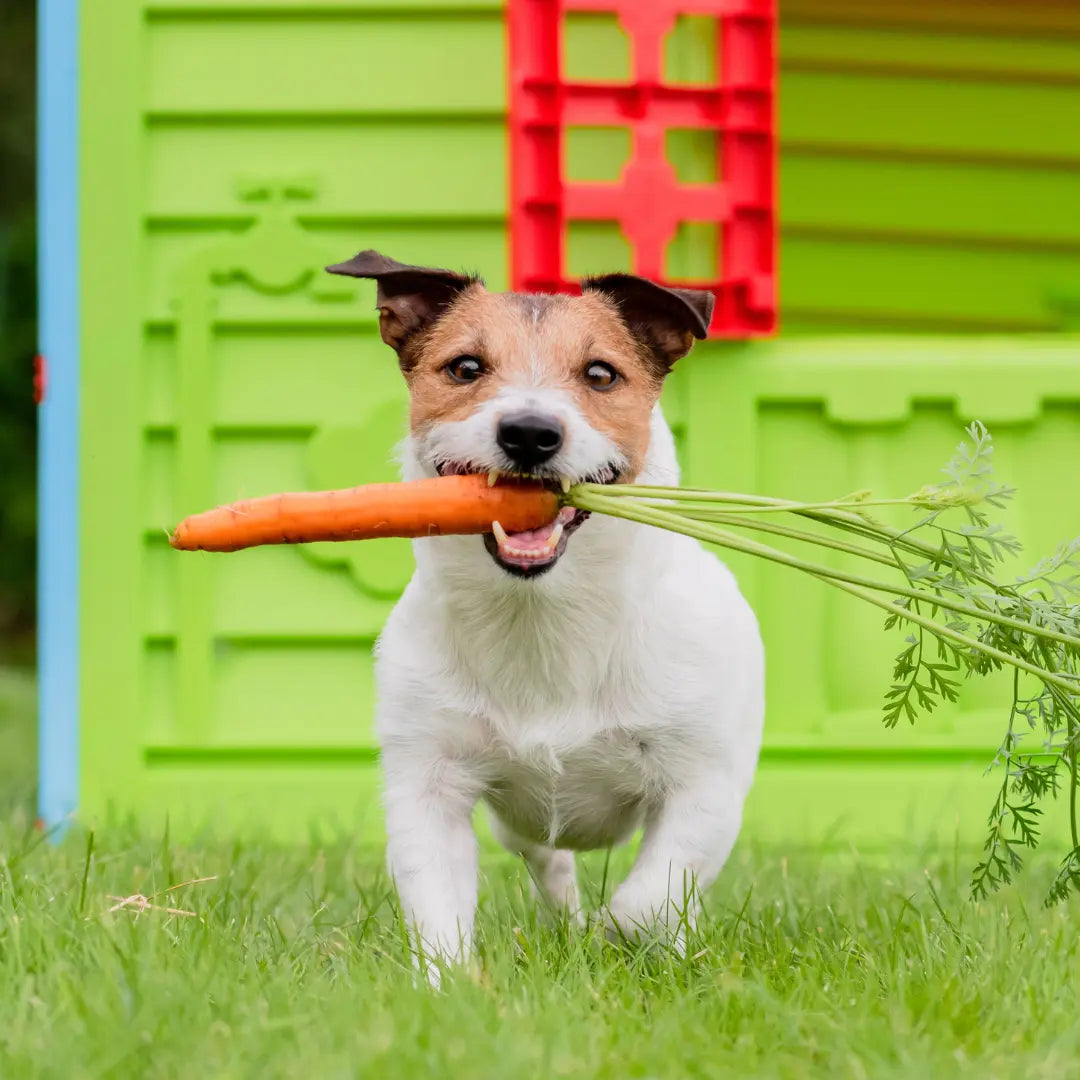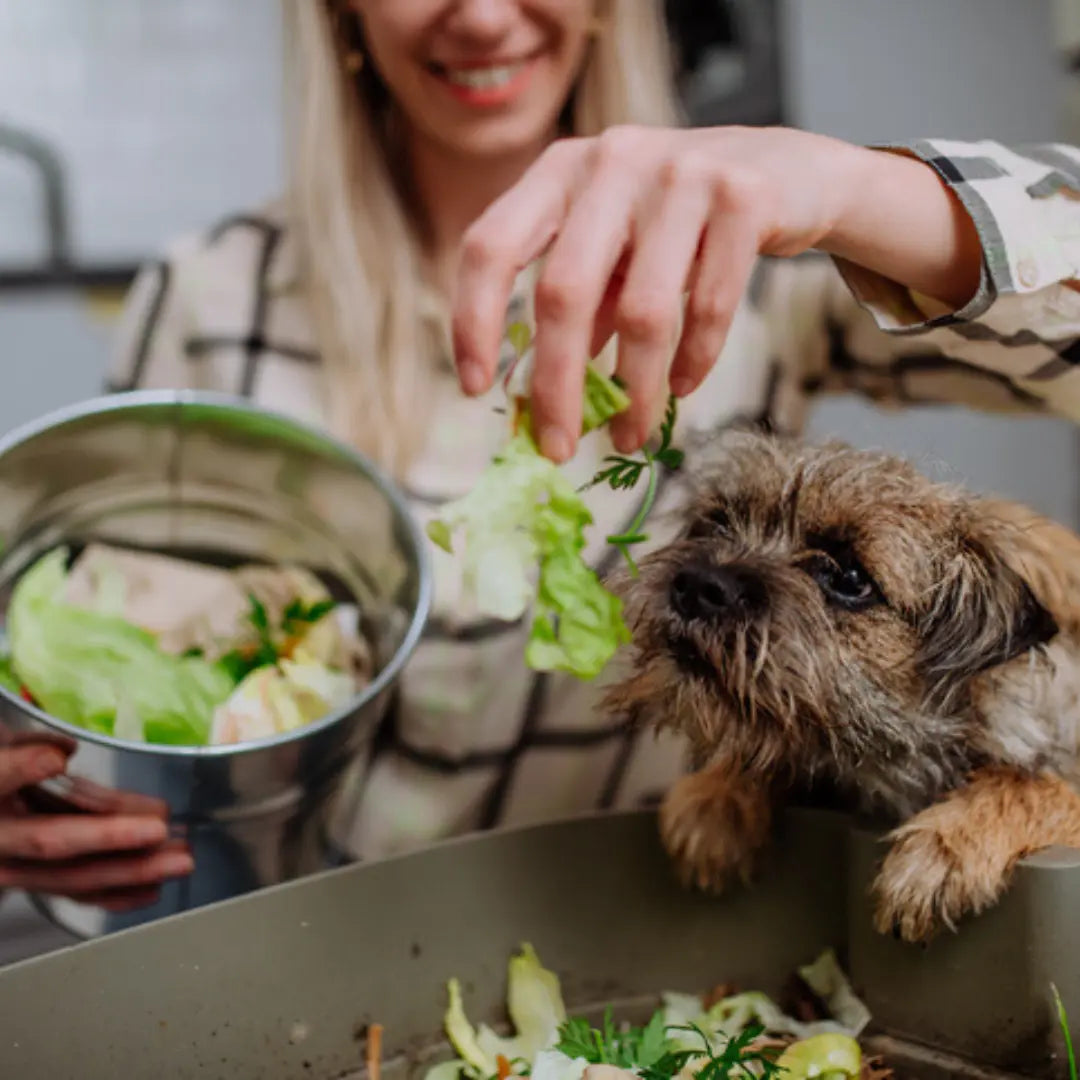Spring Vegetables for Your Dog to Eat: Fresh Whole Foods and Easy Vegetable Recipes for Your Dog
As we move into spring, it's the perfect time to start incorporating fresh whole foods into your dog's diet. Many vegetables that are in season right now provide an array of nutrients that your furry friend needs to thrive. Plus, home-cooking for your dog is a great way to ensure that they're getting the best possible nutrition while also having fun in the kitchen! In this post, we'll explore some of the best spring vegetables for your dog and share some easy treat & homemade meal recipes to try.
The best vegetables to feed your dog in spring include Carrots, Broccoli, Zucchini, Peas, Green Beans, Beets, and Brussel Sprouts. Below we will highlight the benefits of each along with easy-to-make recipes and tips on how to best prepare vegetables for your dog.
Easy Ways to Incorporate Vegetables into our Dog’s Diet: Home Cooked Meals & Treats
Lightly steamed and smaller-sized vegetables are easier for dogs to digest than raw vegetables to get the maximum nutrients. Always remember to make sure to use bite-sized pieces small enough to avoid choking hazards and best to supervise when eating any sort of human food. Also when incorporating new foods into your dog’s diet, always monitor. For some dogs, certain veggies can cause gastro issues and bloating.
How to Prepare Vegetables for Dogs?
- Steam & puree in batches - can be frozen into ice cubes.
- Shred up and incorporate veggies into home-cooked meals or kibble.
- Frozen vegetables are an easy way to incorporate them into treats or meals.
- Canned sweet potatoes and other vegetables are easy and affordable - just make sure they are 100% vegetables with no added spices.
- Baby food purees offer a variety of healthy pure veggie mixes that can be frozen or served fresh.
- Chop veggies your dog loves and dehydrate them in the oven - from beans to sweet potato, these can be low-calorie treats for your dog.
Carrots for Dogs
Carrots are a low-calorie vegetable that's high in fibre and beta-carotene, which your dog's body can convert into vitamin A. This vitamin is essential for healthy eyesight and immune system function. Plus, dogs love their sweet and crunchy taste. You can serve carrots raw or cooked as a snack, or even incorporate them into your dog's meals. Try shredding them and mixing them in with some prepared Dog Child Meal Mix and meal prep into muffin tins for easy portion control.
Brussels Sprouts for Dogs
Brussels sprouts are packed with essential nutrients, vitamins, and minerals that are beneficial for your dog's health. They are an excellent source of vitamin C, K, and folate. Additionally, they contain fiber, antioxidants, and glucosinolates, which are essential in improving your dog's digestion, immune system, and regulating blood sugar levels.
While brussels sprouts are generally safe for dogs, it's essential to remember that every dog's digestive system is unique. Some dogs may experience gas, bloating, or diarrhea after eating brussel sprouts. Additionally, brussels sprouts contain vitamin K, which can interfere with blood-thinning medication. Therefore, if your dog is on any medication, it's best to consult with your veterinarian before feeding them brussels sprouts.
Peas for Dogs
Peas are another great vegetable to feed your dog in the spring. They're low in fat but high in protein and fiber, making them a great addition to any diet. Plus, they contain vitamin K, which is necessary for blood clotting and bone health. There has been some controversy over peas in pet food but this generally involves using peas as a filler ingredient in kibble and the lack of taurine in these diets. Fresh peas in homemade dog food and treats are perfectly ok. You can feed your dog fresh or frozen peas, or even try making some homemade pea and salmon treats.

Dog Child's Chicken Pot Pie Recipe is a one-pot meal packed with protein and nutrients, and is a great way to add peas to your dog's diet!
Broccoli for Dogs
Broccoli is a cruciferous vegetable that's packed with vitamins and minerals. Surprisingly dogs love the taste of broccoli too. It's particularly high in vitamin C, which is essential for immune system function and skin health. In addition, broccoli contains sulforaphane, a compound that has been linked to disease prevention in both humans and animals. Broccoli also is high in calcium. Your dog may prefer it cooked or raw, and it's a great addition to any homemade meal.
 Try out this tasty Dog Child Broccoli Stems & Chicken Pucks Recipe to upcycle your spring veggies and add some variety to your dog's diet!
Try out this tasty Dog Child Broccoli Stems & Chicken Pucks Recipe to upcycle your spring veggies and add some variety to your dog's diet!
Zucchini for Dogs
Zucchini is a low-calorie vegetable that's high in water and fiber, making it a great choice for dogs who need to lose weight. It also contains vitamin C and potassium, which are important for heart health. Try shredding zucchini into your dog’s homemade meals.
Green Beans: Low in Calories and High in Fiber
Green beans are a great option for dogs who struggle with maintaining a healthy weight or need to lose some pounds. These vegetables are low in calories and high in fiber, which aids in digestion and helps your dog feel full for longer. By incorporating green beans into your dog's meals, you can help them manage their weight and keep obesity-related problems at bay. You can also use green beans as fun treats.
A fun and easy green bean treat are to dehydrate them in the oven!
Sweet Potatoes for Dogs
Sweet potatoes are a nutritious vegetable that's high in fiber, vitamin A, and beta-carotene. They're also a great source of complex carbohydrates, which can provide energy and support healthy digestion. You can serve sweet potatoes as a cooked side dish. Or, try making some homemade sweet potato and oatmeal treats by mixing cooked sweet potatoes with oatmeal and baking them until crispy.

This super simple Air Fryer Sweet Potato Treat is a doggy favorite - just slice up some sweet potato and air fry them for your dog!
Beets for Dogs
Beets are loaded with essential vitamins and minerals, making them one of the most nutrient-dense vegetables for both humans and dogs. They're packed with fiber, iron, folate, manganese, potassium, and vitamin C. These nutrients help support your dog's immune system, maintain healthy skin and coat, and promote optimal brain function. Beets also contain betaine, a compound that helps support liver function and can assist with detoxification.
Besides being nutrient-dense, beets are low in calories and have a low glycemic index, which means they won't cause a sudden spike in blood sugar levels. This makes beets a healthy alternative to processed treats.
Homemade Dog Food & Dog Treats
At Dog Child, we believe that our dogs deserve to eat fresh whole foods just like we do. That’s why we’ve created easy home-cooked recipes for dogs and products that support cooking for your dog at home. Our Mixed Veggie Meal Mix is an easy way to incorporate vegetables into your dog’s meals offering many health benefits - filled with organic sweet potato, kale, pumpkin, broccoli and parsley, this mix is loved by even the pickiest of eaters and is easy to digest.
You simply mix in your dog’s protein of choice with water & oil. It really is that easy to start making your own dog food at home! Homemade dog foods can also be used as a topper on kibble. Studies have shown that incorporating even 20% of fresh food into your dog’s daily diet can have a lasting impact on their long-term health and prevention of disease.
As you can see, there are plenty of spring vegetables that your dog can eat to stay healthy and happy. Incorporating fresh whole foods into your dog's diet is not only easy, but it's also a fun way to bond with your furry friend in the kitchen. Plus, by making homemade treats and meals, you can ensure that your dog is getting the best possible nutrition while also avoiding any potentially harmful additives or fillers. So next time you're at the farmer's market or grocery store, be sure to pick up some of these spring veggies and start cooking up some tasty treats homemade for your dog! Happy Home Cooking!





